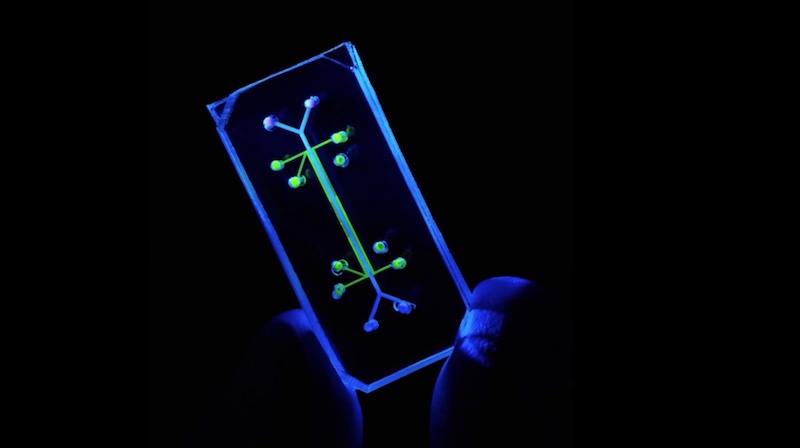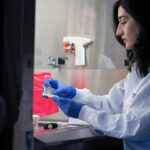Drug-testing alternative: a lung on a chip

Combining microfabrication techniques from the computer industry with modern tissue engineering, a team at Children’s Hospital Boston and Harvard’s Wyss Institute for Biologically Inspired Engineering has created a device that mimics the function of a human lung. This living “lung-on-a-chip,” which incorporates human lung and blood-vessel cells, reproduces the all-important interface between the lung’s tiny air sacs and the bloodstream. Breathing is simulated with a vacuum pump.
The wafer-sized device mimics the human lung’s response to infectious agents, airborne particles and toxins in a way that’s truer to real life than standard cell testing in a lab dish. “We really can’t understand how biology works unless we put it in the physical context of real living cells, tissues and organs,” says Vascular Biology researcher and Wyss Institute founder Don Ingber. Ingber presents the chip in this video, and Dah Huh in his lab demonstrates how it was used to simulate the lung’s immune response to infection.
In the future, this and other organ-on-a-chip systems might provide a way to replace animal studies in testing new drugs. Read more in the June 25 issue of Science.
Related Posts :
-

Four things you should know about MAPCAs treatment
As the first grandchild in her family, Hannah Homan is in demand for frequent visits. She was also the focus ...
-

Treating MAPCAs with unifocalization surgery and cardiology care
Children born with a rare form of tetralogy of Fallot (ToF) face a challenging type of congenital heart ...
-

A unique marker for pericytes could help forge a new path for pulmonary hypertension care
Pulmonary arterial hypertension (PAH) is a rare condition that’s difficult to treat. The hallmarks of the disease — narrowing of ...
-

Modeling urinary tract disorders on a chip: Zohreh Izadifar
When a new tissue sample arrives from the Department of Urology, the Boston Children’s Hospital lab of Zohreh Izadifar, ...





